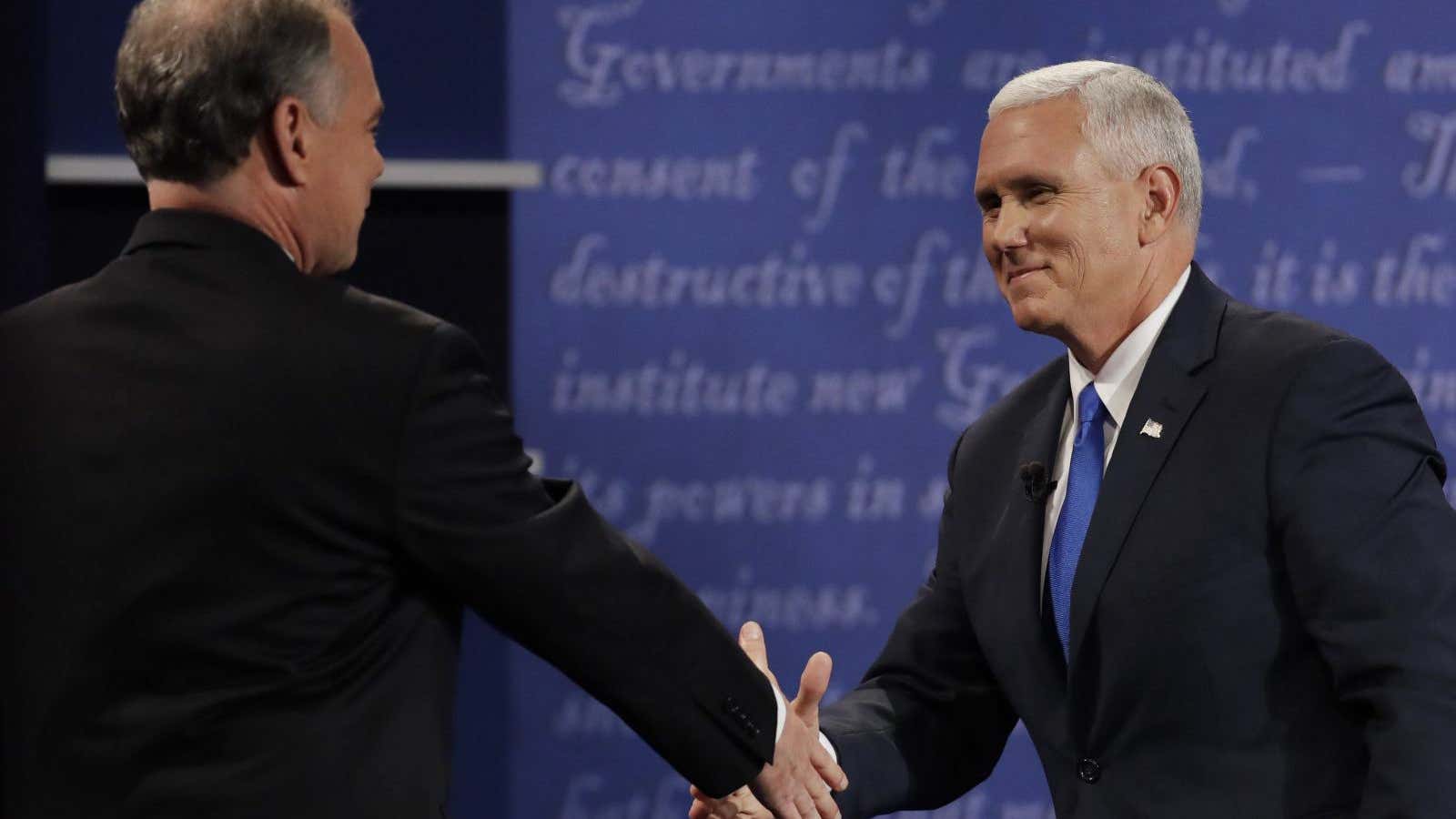Lloyd Bentsen may own the best single line ever uttered in a US vice presidential debate, and Sarah Palin may have added style and zip when it was her year. But for pure pugilistic excitement, neither matches the Oct. 4 debate between Republican Mike Pence and Democrat Tim Kaine.
Vice presidential debates are mostly known for their tedium. After a wholly forgettable evening pitting Democrat Walter Mondale against Republican Bob Dole in 1976, Bentsen seemed to rescue the genre eight years later with his famous line to Republican Dan Quayle, “Senator, you’re no Jack Kennedy.” But the vice presidential debates quickly reverted to form. In 2000, sitting vice president Dick Cheney conducted a boring, maddeningly genteel chat with Democratic challenger Joe Lieberman. And though Palin livened up Republican nominee John McCain’s lackluster campaign in 2008, if in a screwy way, her debate with Joe Biden was lacking in thrills.
So it seemed we were headed for another unexciting showdown at this year’s debate, between Kaine, a Virginia senator prone to smiling the smile of a despised teacher’s pet, and Pence, an earnest Indiana governor with all the personality of a stop sign.
But Kaine signaled from the outset that a very different evening was in store. Starting out civilly and softly, he ended his opening statement with a zinger: With his son Nat Kaine fighting with the Marines abroad, the idea of Republican presidential nominee Donald Trump becoming commander in chief “scares us to death,” Kaine said.
On his next turn at the mic, Kaine went at it again, and again. Democrat Hillary Clinton “has been focused on serving others” all her life, Kaine said, while “Donald Trump always puts himself first.” He interrupted Pence repeatedly. Finally, in a refrain peppered into the debate at least a half-dozen times by his own count, Kaine said he “can’t believe” that Pence defends Trump’s positions.
Pence tried to hang back and not engage, but those were fighting words; you just knew Pence would have to respond, and with something less demure than a well-timed shimmy. So proceeded an explosion of invective, with the men guffawing, dismissing, and sneering, much of the time over one another.
What was it that Pence was saying? Something about Russia? ISIL? Who knew? Who cared?
Mostly it was Pence—as Trump’s running mate—on the receiving end, and it was painful to watch. Trump’s economic ideas amounted to a “you’re fired” plan, Kaine said. “His economic plan is really a Trump-first plan.” Somehow for long minutes during a discussion about law enforcement, Pence backed himself into a corner, and was defending the rights of bigots. “I can’t believe you are defending implicit bias,” Kaine said.
“I’m not defending implicit bias,” Pence protested, but it was too late—Kaine just kept going: “I can’t believe you are defending the insult-driven campaign of Donald Trump.”
There were moments of true poignance as well, specifically when the theme went to faith. Kaine, a Catholic, talked about the strain of having to enforce, as the governor of Virginia, a death penalty that he personally opposed. Pence, a Christian, said he wholly understood, and talked about how his own faith shaped his opposition to abortion. That triggered a polite but vigorous mini-debate about abortion rights, with neither man winning, but both leaving the impression of a depth of sincerity entirely lacking in the presidential debate a week earlier.
At the end, the men thanked each other and said what an honor it was to participate in such an event. As an observer, I thanked them silently for the spectacle that political debate at its best is supposed to be.
